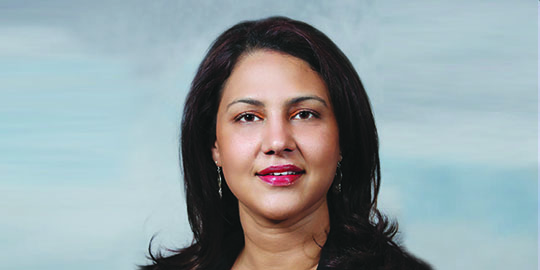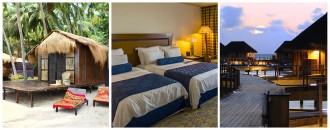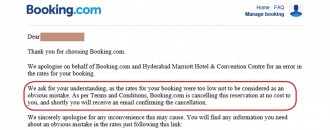
An Eye for Detail
Wouldn't be wrong to say that Deepika has over the years been a part of the core team that has made fiery growth possible for Wyndham Hotels in India. To speak in common parlance, she's running the show for the 'Ramada' chain of hotels in Eurasia!
Ahmad Shariq Khan | March 2016 Issue | The Dollar Business
Today, Wyndham is the world’s largest hotel company, specialising in mid-market and budget hotels, but the success saga that the hospitality chain enjoys today neither came easy nor was it immediate. And India is no exception! In fact, in 2000, when the group entered the country, it had only eight hotels but thanks to persistent, innovative efforts by Deepika Arora, who left her high-profile managerial position at Hilton to take a plunge into this lesser known brand (in the domestic market), the diversified hotel chain now sits pretty, amongst the leading names in the segment. In fact, the group’s rise has been so phenomenal that hospitality consultancy HVS’s 2014 report placed it at the 12th spot among the biggest hotel chains in the country – in terms of rooms – ahead of hospitality giants including The Leela, The Lalit and Hilton chains!
On her journey so far, Deepika says, “It has been an exciting and a challenging journey. Within a short span, we scaled the business from eight properties in 2010 to 25 properties in 2016, with about 2,618 rooms in India under the Ramada, Ramada Encore, Howard Johnson and Days Inn brands and 33 operating hotels with 3,744 rooms in Eurasia”. The group is now looking at tier 2 and 3 cities as potential markets for expansion. And needless to say, is serving a great deal to earning forex for the country from services exports.
"This year, we are planning to continue focussing on the overall growth strategy of the group and are expecting to move from a challenger position to a leadership position in the near future," she adds.
Deepika’s efforts got her promoted to Regional Vice President, Eurasia, last year which, besides India, made her in-charge of this fast growing hospitality chain’s properties in 14 overseas destinations including Sri Lanka, Maldives, Seychelles, Bangladesh and Kazakhstan.
Having made a mark for herself in a male-dominated profession, she believes that building and maintaining a strong sense of confidence has been the key to her success. “I have never hesitated on learning from my mistakes,” says Deepika who admires Arianna Huffington, for her role in creating a social media empire, thereby influencing millions across the globe. Well, we don't know about media empires, but Deepika's definitely made it her objective to influence millions of travellers across two continents.
TDB: You studied architecture, but preferred a career in the hospitality sector. Can you please tell us what made you choose this sector?
Deepika Arora (DA): I opted to enter the hospitality industry purely because of my passion for this industry. My professional qualification and learnings helped me leverage my skills to understand the sector and make a mark in it. I capitalised on my creative traits such as keeping an eye for detail without losing sight of the bigger picture. Inculcating a sense of design and at the same time maintaining relationships from the customer’s point of view has helped me build an understanding from a more holistic perspective.
TDB: In spite of the economic slowdown and an overall subdued industry sentiment, Wyndham Hotel Group in India has continued to add properties. Any success mantra you would like to share with industry professionals?
DA: India is a strategic market for Wyndham Hotel Group and the key to success here is our franchise-based model. The model involves an investment by the franchisee in a property while the group provides virtual and hands-on support including revenue management, service culture training, access to global sales experts and accounts, strategic sourcing opportunities, on-going operational support and marketing services.
We are focused on proactively growing our brands by ensuring that we place the right hotels in the right markets with the right ownership. We also operate primarily in those markets where we know our hotel brands and owners will be successful. This is important in the business that we are in.
TDB: In the hospitality sector, keeping the highest level of standards and adhering to global norms/ protocols is key. How do you ensure that across all your locations globally?
DA: In the hospitality sector, it is necessary to keep highest level of standards and adhere to global norms. We maintain very strict quality standards and we expect our franchisees to uphold our mantle with regard to the quality of service and inventory that we provide globally.
Thus, to ensure constantly high standards of services around the year, our internal operations team reviews our franchisees and their properties from time to time and they have to conform to Wyndham Hotel Group’s standards at all times. We also insist on annual quality audits at all hotels by an external auditor. If a hotel or a franchisee fails the external audit for three consecutive years, its contract is terminated. Hotels are also trained to conduct monthly self-assessments.
TDB: What should India do to increase its hospitality revenues from international tourists?
DA: India is in the defining stage of the business of hospitality. While the possibilities for growth are immense, it will take an earnest effort, both from the industry’s key stakeholders in the private sector and the relevant government bodies, to truly change the Indian hospitality landscape in the years to come.
The long-term outlook for the Indian tourism and hospitality continues to be positive, highlighting a huge growth potential. According to the Ministry of Tourism, the industry saw a phenomenal growth of 1,073.8% in tourist arrivals facilitated by the introduction of the E-visa scheme to 113 countries. The cascading effect of this on the hospitality sector has resulted in an increase in the occupancy ratios and average room rates. While the government has implemented several schemes and policies, there lies a huge gap in terms of travel facilities, infrastructure, hotels and recreational outlets.
It is imperative to market and brand India globally to create a huge impact and attract high-end international tourists.
TDB: Please tell us about some of your short term and long term professional priorities. Would you also like to share any priority on the personal front?
DA: My immediate professional goal for Wyndham Hotel Group would be to devise a successful strategy for expanding footprints and simultaneously striving to escalate the brand from a challenger to a leadership position, while the long-term goal will be to sustain the leadership position.
On the personal front, fitness is really important for me. I want to stay mentally and physically active at every stage of life. In the pursuit of fitness, I enjoy running and aim to train for various marathons this year. 
TDB: From one brand to four, from eight properties to 25 – what makes the Wyndham chain so special?
DA: India is a strategic market for the Wyndham Hotel Group and the key to success here is our franchise-based model. Within a span of five years, Wyndham Hotel Group has expanded its brand portfolio exponentially in India. The group has grown from one brand – Ramada – in 2010 to four new brands with 25 operational properties in the Indian market. With highly recognisable brands and hotel choices in every category from upper-upscale to economy, we offer not only the most lodging choices around the world but also exceptional customer service and great value. Hence, with the pace at which we are growing in the Indian market, we would prefer to remain committed to our hospitality business with a diversified brand portfolio for specific market needs.







 to success.
to success.